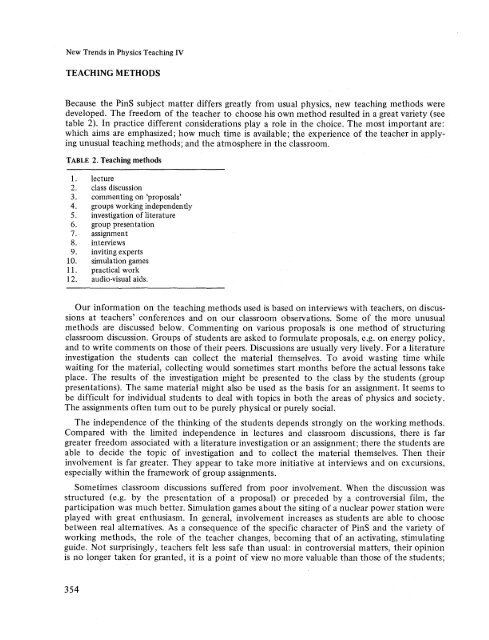New trends in physics teaching, v.4; The ... - unesdoc - Unesco
New trends in physics teaching, v.4; The ... - unesdoc - Unesco
New trends in physics teaching, v.4; The ... - unesdoc - Unesco
You also want an ePaper? Increase the reach of your titles
YUMPU automatically turns print PDFs into web optimized ePapers that Google loves.
<strong>New</strong> Trends <strong>in</strong> Physics Teach<strong>in</strong>g IV<br />
TEACHING METHODS<br />
Because the P<strong>in</strong>s subject matter differs greatly from usual <strong>physics</strong>, new teach<strong>in</strong>g methods were<br />
developed. <strong>The</strong> freedom of the teacher to choose his own method resulted <strong>in</strong> a great variety (see<br />
table 2). In practice different considerations play a role <strong>in</strong> the choice. <strong>The</strong> most important are:<br />
which aims are emphasized; how much time is available; the experience of the teacher <strong>in</strong> apply<strong>in</strong>g<br />
unusual teach<strong>in</strong>g methods; and the atmosphere <strong>in</strong> the classroom.<br />
TABLE 2. Teach<strong>in</strong>g methods<br />
1. lecture<br />
2. class discussion<br />
3. comment<strong>in</strong>g on ‘proposals’<br />
4. groups work<strong>in</strong>g <strong>in</strong>dependently<br />
5. <strong>in</strong>vestigation of literature<br />
6. group presentation<br />
7. assignment<br />
8. <strong>in</strong>terviews<br />
9. <strong>in</strong>vit<strong>in</strong>g experts<br />
10. simulation games<br />
1 1. practical work<br />
12. audio-visual aids.<br />
Our <strong>in</strong>formation on the teach<strong>in</strong>g methods used is based on <strong>in</strong>terviews with teachers, on discussions<br />
at teachers’ conferences and on our classroom observations. Some of the more unusual<br />
methods are discussed below. Comment<strong>in</strong>g on various proposals is one method of structur<strong>in</strong>g<br />
classroom discussion. Groups of students are asked to formulate proposals, e.g. on energy policy,<br />
and to write comments on those of their peers. Discussions are usually very lively. For a literature<br />
<strong>in</strong>vestigation the students can collect the material themselves. To avoid wast<strong>in</strong>g time while<br />
wait<strong>in</strong>g for the material, collect<strong>in</strong>g would sometimes start months before the actual lessons take<br />
place. <strong>The</strong> results of the <strong>in</strong>vestigation might be presented to the class by the students (group<br />
presentations). <strong>The</strong> same material might also be used as the basis for an assignment. It seems to<br />
be difficult for <strong>in</strong>dividual students to deal with topics <strong>in</strong> both the areas of <strong>physics</strong> and society.<br />
<strong>The</strong> assignments often turn out to be purely physical or purely social.<br />
<strong>The</strong> <strong>in</strong>dependence of the th<strong>in</strong>k<strong>in</strong>g of the students depends strongly on the work<strong>in</strong>g methods.<br />
Compared with the limited <strong>in</strong>dependence <strong>in</strong> lectures and classroom discussions, there is far<br />
greater freedom associated with a literature <strong>in</strong>vestigation or an assignment; there the students are<br />
able to decide the topic of <strong>in</strong>vestigation and to collect the material themselves. <strong>The</strong>n their<br />
<strong>in</strong>volvement is far greater. <strong>The</strong>y appear to take more <strong>in</strong>itiative at <strong>in</strong>terviews and on excursions,<br />
especially with<strong>in</strong> the framework of group assignments.<br />
Sometimes classroom discussions suffered from poor <strong>in</strong>volvement. When the discussion was<br />
structured (e.g. by the presentation of a proposal) or preceded by a controversial film, the<br />
participation was much better. Simulation games about the sit<strong>in</strong>g of a nuclear power station were<br />
played with great enthusiasm. In general, <strong>in</strong>volvement <strong>in</strong>creases as students are able to choose<br />
between real alternatives. As a consequence of the specific character of P<strong>in</strong>s and the variety of<br />
work<strong>in</strong>g methods, the role of the teacher changes, becom<strong>in</strong>g that of an activat<strong>in</strong>g, stimulat<strong>in</strong>g<br />
guide. Not surpris<strong>in</strong>gly, teachers felt less safe than usual: <strong>in</strong> controversial matters, their op<strong>in</strong>ion<br />
is no longer taken for granted, it is a po<strong>in</strong>t of view no more valuable than those of the students;<br />
354
















